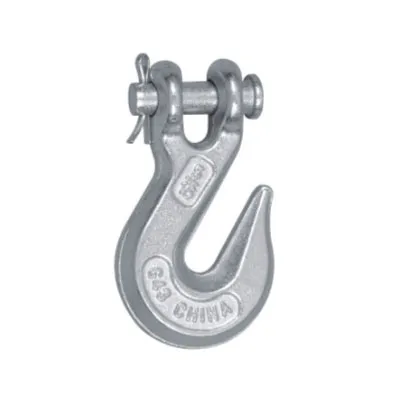Detailed Overview of Forged Clevis Grab Hook
2024-07-30
A forged clevis grab hook is a heavy-duty hardware component used in various lifting and securing applications. Its robust design makes it suitable for high-stress environments, such as construction sites, towing, and industrial settings. Here’s a detailed overview of its features, benefits, and applications:
Key Features:
1. Forged Construction:
- Material: Typically made from high-strength steel, such as carbon or alloy steel, forged for enhanced durability and load-bearing capacity.
- Manufacturing Process: The forging process involves shaping the metal using high pressure and heat, resulting in a stronger and more reliable hook compared to cast or stamped alternatives.
2. Clevis Design:
- Clevis Attachment: Designed to be used with a clevis pin or bolt, allowing for quick and secure attachment to chains, ropes, or other rigging components.
- Pin and Hole Configuration: Features a hole for the clevis pin, ensuring a stable connection.
3. Grab Hook Configuration:
- Hook Shape: The “grab” design allows the hook to securely hold and grip the chain or rope, preventing accidental disengagement.
- Open Design: Typically features an open throat design, making it easier to insert and remove the chain.
4. Load Capacity:
- High Load Ratings: Rated for heavy loads, with capacities often specified by the manufacturer based on factors such as material strength and hook size.
5. Finish:
- Protective Coating: May come with various finishes, such as powder coating, galvanized, or zinc-plated, to resist corrosion and extend the hook's service life.
Benefits:
1. Strength and Durability:
- High Load Capacity: Capable of handling heavy loads and high-stress applications due to its forged steel construction.
- Resilient to Wear: Forged steel is more resistant to wear and deformation under heavy loads.
2. Ease of Use:
- Quick Attachment: The clevis design allows for fast and easy attachment to other rigging components, saving time and effort.
- Secure Grip: The grab hook securely holds chains or ropes, reducing the risk of slippage.
3. Versatility:
- Wide Applications: Suitable for various tasks, including lifting, securing loads, towing, and rigging.
- Adaptability: Can be used with different sizes and types of chains or ropes.
4. Safety:
- Reliable Connection: Provides a strong and reliable connection, enhancing safety during lifting and securing operations.
- Reduced Risk of Failure: Forged construction reduces the likelihood of failure compared to lower-quality components.
Applications:
1. Construction:
- Lifting Equipment: Used for lifting and securing heavy equipment and materials on construction sites.
- Rigging: Essential for rigging tasks involving chains and ropes.
2. Towing:
- Vehicle Recovery: Used in tow trucks and recovery vehicles to secure and pull vehicles.
- Heavy-Duty Towing: Suitable for towing large and heavy loads.
3. Industrial:
- Material Handling: Used in industrial settings for handling and moving heavy materials and machinery.
- Loading and Unloading: Facilitates the loading and unloading of cargo.
4. Agriculture:
- Farm Equipment: Used for securing and attaching farm equipment and tools.
Considerations:
1. Load Capacity:
- Ensure Compatibility: Always check the load capacity of the hook to ensure it matches or exceeds the requirements of your application.
2. Maintenance:
- Regular Inspection: Periodically inspect the hook for signs of wear, deformation, or damage to ensure safe operation.
- Cleaning and Lubrication: Maintain the hook by cleaning it regularly and applying lubrication to moving parts.
3. Compatibility:
- Chain and Pin Size: Ensure the hook is compatible with the size of the chain and clevis pin or bolt being used.
A forged clevis grab hook is a critical component for secure and efficient lifting and rigging operations. Its robust construction and versatile design make it a valuable tool for various heavy-duty applications.



